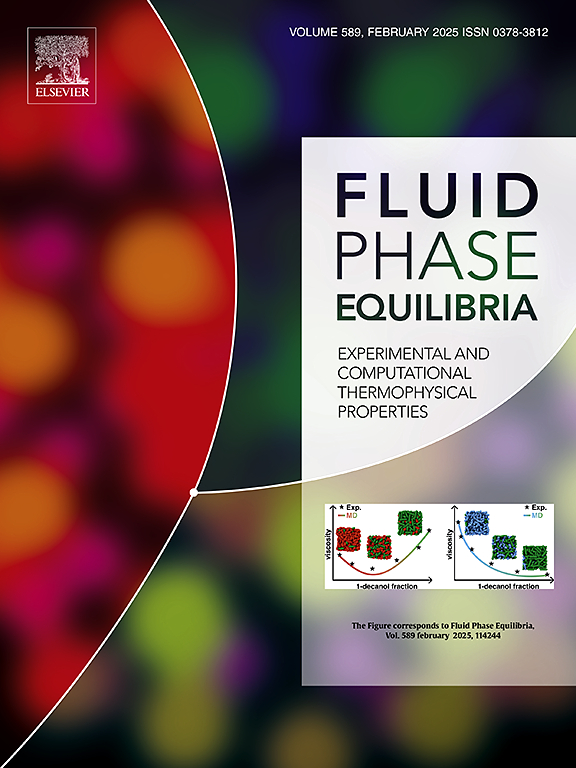Liquid-liquid equilibria of biodiesel + glycerol and biodiesel + water binary systems
IF 2.8
3区 工程技术
Q3 CHEMISTRY, PHYSICAL
引用次数: 0
Abstract
The liquid-liquid equilibria (LLE) of the biodiesel + glycerol and biodiesel + water binary systems are experimentally measured at atmospheric pressure and in the temperature range from 310.35 K to 338.15 K, conditions relevant to the industrial process, solving the experimental challenges related to their direct measurement. The LLE data of these binary systems are pivotal for designing the biodiesel purification processes and determine the chemical equilibrium constant of the transesterification reaction of vegetable oil into biodiesel. However, unlike to the present study, this information is typically indirectly extrapolated from models regressed on ternary systems, undermining the reliability of the results. The experimental data were compared against the calculations provided by the UNIQUAC and UNIFAC models, with the binary interactions parameters (BIPs) of the UNIQUAC model validated on the experimental data. To ensure a thermodynamically consistent representation of the phase behaviour and smooth the experimental scattering of trace components, the BIPs are regressed by means of an algorithm that considers the experimental uncertainty. The results are compared with LLE data for biodiesel + glycerol and biodiesel + water from ternary systems measured by other laboratories.
生物柴油+甘油和生物柴油+水二元体系的液-液平衡
在常压和310.35 K ~ 338.15 K的工业条件下,对生物柴油+甘油和生物柴油+水二元体系的液-液平衡(LLE)进行了实验测量,解决了直接测量的实验难题。这些二元体系的LLE数据对于设计生物柴油提纯工艺和确定植物油酯交换反应的化学平衡常数具有重要意义。然而,与本研究不同的是,这些信息通常是间接地从三元系统回归的模型中推断出来的,从而破坏了结果的可靠性。将实验数据与UNIQUAC模型和UNIFAC模型的计算结果进行比较,验证了UNIQUAC模型的二元相互作用参数(BIPs)。为了确保相行为的热力学一致表示并平滑痕量组分的实验散射,通过考虑实验不确定性的算法对BIPs进行了回归。结果与其他实验室测量的三元体系中生物柴油+甘油和生物柴油+水的LLE数据进行了比较。
本文章由计算机程序翻译,如有差异,请以英文原文为准。
求助全文
约1分钟内获得全文
求助全文
来源期刊

Fluid Phase Equilibria
工程技术-工程:化工
CiteScore
5.30
自引率
15.40%
发文量
223
审稿时长
53 days
期刊介绍:
Fluid Phase Equilibria publishes high-quality papers dealing with experimental, theoretical, and applied research related to equilibrium and transport properties of fluids, solids, and interfaces. Subjects of interest include physical/phase and chemical equilibria; equilibrium and nonequilibrium thermophysical properties; fundamental thermodynamic relations; and stability. The systems central to the journal include pure substances and mixtures of organic and inorganic materials, including polymers, biochemicals, and surfactants with sufficient characterization of composition and purity for the results to be reproduced. Alloys are of interest only when thermodynamic studies are included, purely material studies will not be considered. In all cases, authors are expected to provide physical or chemical interpretations of the results.
Experimental research can include measurements under all conditions of temperature, pressure, and composition, including critical and supercritical. Measurements are to be associated with systems and conditions of fundamental or applied interest, and may not be only a collection of routine data, such as physical property or solubility measurements at limited pressures and temperatures close to ambient, or surfactant studies focussed strictly on micellisation or micelle structure. Papers reporting common data must be accompanied by new physical insights and/or contemporary or new theory or techniques.
 求助内容:
求助内容: 应助结果提醒方式:
应助结果提醒方式:


